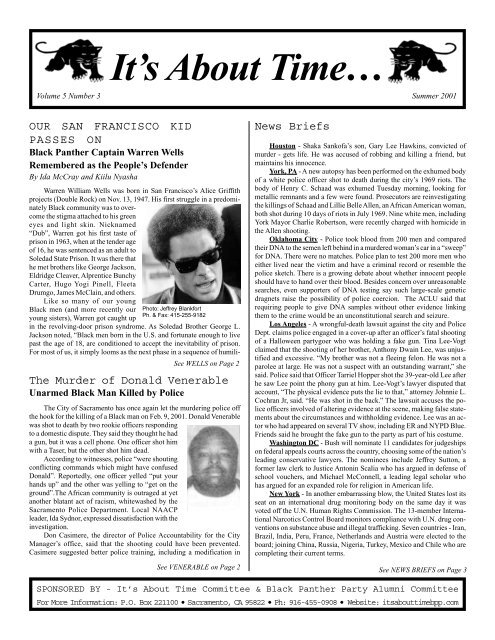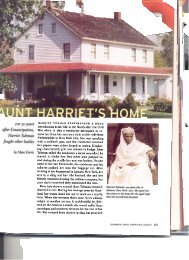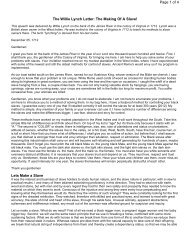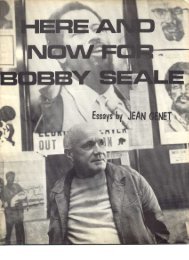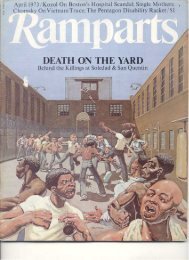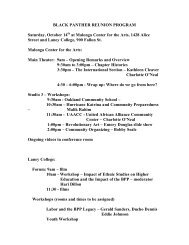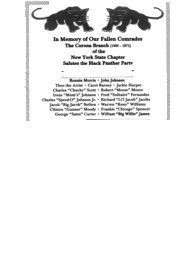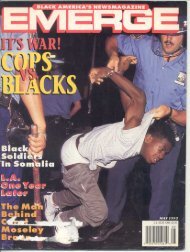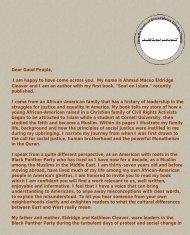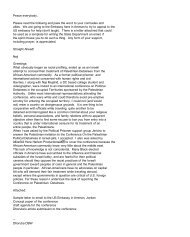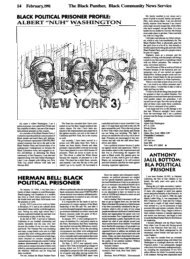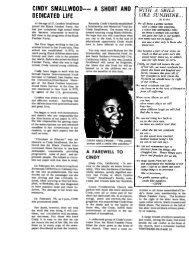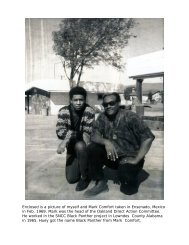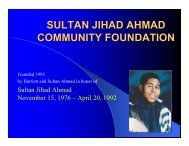It's About Time Volume 5, No. 3
It's About Time Volume 5, No. 3
It's About Time Volume 5, No. 3
You also want an ePaper? Increase the reach of your titles
YUMPU automatically turns print PDFs into web optimized ePapers that Google loves.
It’s <strong>About</strong> <strong>Time</strong>…<br />
<strong>Volume</strong> 5 Number 3 Summer 2001<br />
OUR SAN FRANCISCO KID<br />
PASSES ON<br />
Black Panther Captain Warren Wells<br />
Remembered as the People’s Defender<br />
By Ida McCray and Kiilu Nyasha<br />
Warren William Wells was born in San Francisco’s Alice Griffith<br />
projects (Double Rock) on <strong>No</strong>v. 13, 1947. His first struggle in a predominately<br />
Black community was to overcome<br />
the stigma attached to his green<br />
eyes and light skin. Nicknamed<br />
“Dub”, Warren got his first taste of<br />
prison in 1963, when at the tender age<br />
of 16, he was sentenced as an adult to<br />
Soledad State Prison. It was there that<br />
he met brothers like George Jackson,<br />
Eldridge Cleaver, Alprentice Bunchy<br />
Carter, Hugo Yogi Pinell, Fleeta<br />
Drumgo, James McClain, and others.<br />
Like so many of our young<br />
Black men (and more recently our<br />
young sisters), Warren got caught up<br />
Photo: Jeffrey Blankfort<br />
Ph. & Fax: 415-255-9182<br />
in the revolving-door prison syndrome. As Soledad Brother George L.<br />
Jackson noted, “Black men born in the U.S. and fortunate enough to live<br />
past the age of 18, are conditioned to accept the inevitability of prison.<br />
For most of us, it simply looms as the next phase in a sequence of humili-<br />
See WELLS on Page 2<br />
The Murder of Donald Venerable<br />
Unarmed Black Man Killed by Police<br />
The City of Sacramento has once again let the murdering police off<br />
the hook for the killing of a Black man on Feb. 9, 2001. Donald Venerable<br />
was shot to death by two rookie officers responding<br />
to a domestic dispute. They said they thought he had<br />
a gun, but it was a cell phone. One officer shot him<br />
with a Taser, but the other shot him dead.<br />
According to witnesses, police “were shouting<br />
conflicting commands which might have confused<br />
Donald”. Reportedly, one officer yelled “put your<br />
hands up” and the other was yelling to “get on the<br />
ground”.The African community is outraged at yet<br />
another blatant act of racism, whitewashed by the<br />
Sacramento Police Department. Local NAACP<br />
leader, Ida Sydnor, expressed dissatisfaction with the<br />
investigation.<br />
Don Casimere, the director of Police Accountability for the City<br />
Manager’s office, said that the shooting could have been prevented.<br />
Casimere suggested better police training, including a modification in<br />
See VENERABLE on Page 2<br />
News Briefs<br />
Houston - Shaka Sankofa’s son, Gary Lee Hawkins, convicted of<br />
murder - gets life. He was accused of robbing and killing a friend, but<br />
maintains his innocence.<br />
York, PA - A new autopsy has been performed on the exhumed body<br />
of a white police officer shot to death during the city’s 1969 riots. The<br />
body of Henry C. Schaad was exhumed Tuesday morning, looking for<br />
metallic remnants and a few were found. Prosecutors are reinvestigating<br />
the killings of Schaad and Lillie Belle Allen, an African American woman,<br />
both shot during 10 days of riots in July 1969. Nine white men, including<br />
York Mayor Charlie Robertson, were recently charged with homicide in<br />
the Allen shooting.<br />
Oklahoma City - Police took blood from 200 men and compared<br />
their DNA to the semen left behind in a murdered woman’s car in a “sweep”<br />
for DNA. There were no matches. Police plan to test 200 more men who<br />
either lived near the victim and have a criminal record or resemble the<br />
police sketch. There is a growing debate about whether innocent people<br />
should have to hand over their blood. Besides concern over unreasonable<br />
searches, even supporters of DNA testing say such large-scale genetic<br />
dragnets raise the possibility of police coercion. The ACLU said that<br />
requiring people to give DNA samples without other evidence linking<br />
them to the crime would be an unconstitutional search and seizure.<br />
Los Angeles - A wrongful-death lawsuit against the city and Police<br />
Dept. claims police engaged in a cover-up after an officer’s fatal shooting<br />
of a Halloween partygoer who was holding a fake gun. Tina Lee-Vogt<br />
claimed that the shooting of her brother, Anthony Dwain Lee, was unjustified<br />
and excessive. “My brother was not a fleeing felon. He was not a<br />
parolee at large. He was not a suspect with an outstanding warrant,” she<br />
said. Police said that Officer Tarriel Hopper shot the 39-year-old Lee after<br />
he saw Lee point the phony gun at him. Lee-Vogt’s lawyer disputed that<br />
account, “The physical evidence puts the lie to that,” attorney Johnnie L.<br />
Cochran Jr, said. “He was shot in the back.” The lawsuit accuses the police<br />
officers involved of altering evidence at the scene, making false statements<br />
about the circumstances and withholding evidence. Lee was an actor<br />
who had appeared on several TV show, including ER and NYPD Blue.<br />
Friends said he brought the fake gun to the party as part of his costume.<br />
Washington DC - Bush will nominate 11 candidates for judgeships<br />
on federal appeals courts across the country, choosing some of the nation’s<br />
leading conservative lawyers. The nominees include Jeffrey Sutton, a<br />
former law clerk to Justice Antonin Scalia who has argued in defense of<br />
school vouchers, and Michael McConnell, a leading legal scholar who<br />
has argued for an expanded role for religion in American life.<br />
New York - In another embarrassing blow, the United States lost its<br />
seat on an international drug monitoring body on the same day it was<br />
voted off the U.N. Human Rights Commission. The 13-member International<br />
Narcotics Control Board monitors compliance with U.N. drug conventions<br />
on substance abuse and illegal trafficking. Seven countries - Iran,<br />
Brazil, India, Peru, France, Netherlands and Austria were elected to the<br />
board; joining China, Russia, Nigeria, Turkey, Mexico and Chile who are<br />
completing their current terms.<br />
See NEWS BRIEFS on Page 3<br />
SPONSORED BY - It’s <strong>About</strong> <strong>Time</strong> Committee & Black Panther Party Alumni Committee<br />
For More Information: P.O. Box 221100 • Sacramento, CA 95822 • Ph: 916-455-0908 • Website: itsabouttimebpp.com
Cincinnati Fires<br />
By Mumia Abu-Jamal<br />
“The government is only<br />
as lasting as your understanding<br />
of administration. The<br />
Army is nothing without<br />
people, the Air Force is<br />
grounded without your endorsement,<br />
the ships of the<br />
Navy could never have sailed<br />
if your leaders didn’t have you<br />
sail ‘em, and the brutal depravity<br />
of police would be<br />
non-existent if you didn’t<br />
wear the uniform.” - John Africa,<br />
“On the Move” (1975)<br />
Black youthful rage explodes<br />
in Cincinnati, Ohio, and several nights of fire, rebellion and pain<br />
reminds us that the much-maligned and heralded “60’s were really not so<br />
very long ago. For like the riots that rocked the nation in the 1960’s, the<br />
precipitating event was an act of brutality and violence by police against<br />
black folks. Police violence against blacks has sparked rampages of rebellion<br />
from coast to coast, costing hundreds of millions of dollars in destroyed<br />
property, and hundreds of lost lives.<br />
Over 30 years have passed, and in the intervening years we have<br />
seen the emergence of the black political class and the entrenchment of<br />
the black poor in inner cities, projects, and ghettoes more desolate, more<br />
isolated and more hopeless than the 1960’s. We have seen the explosion<br />
of the Prison Industrial Complex, at rates that would’ve been unthinkable<br />
in the 1970’s, with upwards of 2,000,000 men, women, and juveniles in<br />
American jails. The U.S., with only 5 percent of the world’s population,<br />
has 25 percent of the world’s prison population!<br />
And for black young men and women, the horror of prison has become a<br />
perverse rite of passage, marking one’s transition from youth to adulthood.<br />
So, while things have gotten better for some African-Americans since<br />
the 1960’s, things have gotten demonstrably worse for millions of other,<br />
poorer blacks. Public schools, never quite outstanding in the first place,<br />
have gone into decline. City services have declined. Industries have fled<br />
cities for the South and the suburbs, leaving cities with less employment,<br />
and with remaining jobs paying far less money, while costs have gone up.<br />
Cincinnati, sparked by the police shooting of a black man, could<br />
have happened anywhere in America. The social ingredients are all there,<br />
in every major city in America. In every major city is economic and social<br />
despair, mixed with a militaristic police force that targets black life and<br />
liberty. In every such city are black politicians who function in the role of<br />
keeping the restless natives in check; keep them suffering in silence.<br />
Cincinnati represented the eruption of youth who see their position<br />
in grim, hopeless situations. Cincinnati is a harbinger of things to come.<br />
Cincinnati is the fire next time.<br />
WELLS from Page 1<br />
ations. Being born a slave in a captive society and never experiencing any<br />
objective basis for expectation had the effect of preparing me for the progressively<br />
traumatic misfortunes that lead so many black men to the prison<br />
gate. I was prepared for prison.”<br />
While out of prison in 1967, Eldridge brought Warren into the Black<br />
Panther Party, whereupon he became the Sergeant at Arms, or Captain<br />
Wells. He was also dubbed “The San Francisco Kid.” Dedicated and fearless,<br />
Warren was a powerful functionary of the Party on both sides of the<br />
Bay. In 1968, he was shot and wounded, along with Eldridge, during the<br />
firefight between the Panthers and police that martyred Lil Bobby Hutton,<br />
murdered in cold blood by Oakland, police.<br />
Warren loved his people, his fellow prisoners. He hated injustice, racism,<br />
and this rotten system and knew exactly where to direct his rage. Needless to say,<br />
this level of rebellious consciousness made him a threat and a target.<br />
Back in prison, San Quentin, at the age of 22, Warren planted the<br />
seeds of struggle and all he had learned from the Party among his fellow<br />
2<br />
BLACK PANTHER PARTY<br />
HISTORY - WRITING CONTEST<br />
You can be a part of history…<br />
The Black Panther Party for<br />
Self-Defense (BPP) was born thirtyfive<br />
years ago in Oakland, CA. This<br />
October, former members of the BPP and<br />
their supporters will meet in Washington<br />
DC. Our reunion is not just a sentimental<br />
journey, but a conference to plan strategies to<br />
free our political prisoners and to address the social ills<br />
which afflict our communities to this day.<br />
We will publish a program, which will be a limited edition, historical<br />
document. Your work will appear in this program if you are a winner of<br />
the It’s <strong>About</strong> <strong>Time</strong> Writing Contest. The theme of this contest is: “What<br />
is/was the significance of the Black Panther Party for Self-Defense in the<br />
Black Liberation Struggle”<br />
There are two categories - poetry and essay. The winning piece in<br />
each category will be published in the 35 th Anniversary Program. Runners<br />
up will be published in the “It’s <strong>About</strong> <strong>Time</strong>” newsletter. Winners will<br />
also receive two copies of the program and a year of the “It’s <strong>About</strong> <strong>Time</strong>”<br />
newsletter.<br />
Poems are not to exceed thirty (30) lines. Essays should be approximately<br />
1500 words in length. Prisoners are encouraged to apply. There is<br />
a reading fee of $10 per entry; up to three poems may be entered at one<br />
time. The fee is waived for prisoners. The proceeds of the contest will be<br />
used to publish the program and to defray costs of the reunion.<br />
Entries will be screened by Sister Sheba Haven, former literary editor<br />
of the Black Panther Newspaper, Black Community News Service.<br />
Five finalists in each category, and the winner in each, will be chosen by<br />
a panel of judges. Entries will be judged on the basis of ideological understanding,<br />
historical accuracy, originality and style.<br />
Deadline for contest entries is August 21, 2001. Address all entries<br />
and make check or money order payable to:<br />
It’s <strong>About</strong> <strong>Time</strong><br />
P.O. Box 221100<br />
Sacramento, CA 95822<br />
Attn. Sister Sheba<br />
VENERABLE from Page 1<br />
police policy on weapon’s and use of force, Taser training and audio-video<br />
recording devices.<br />
The police department said that race played no role in the incident, but<br />
the community does not believe that. Ninety percent of black people in Sacramento<br />
believe the Sacramento Police Department and the Sheriff’s Dept.<br />
include KKK type racist officers and that racial profiling is the norm here.<br />
As of Feb. 22, <strong>No</strong>rma Venerable, the victim’s mother filed a lawsuit<br />
against the Police Department for violating Donald’s civil rights.<br />
prisoners, raising political awareness and organizing prisoner solidarity.<br />
One of his best friends was James McClain, who was martyred in the<br />
Marin Courthouse Slave Rebellion of Aug. 7, 1970. It was McClain, William<br />
Christmas, Jonathan Jackson and Warren who planned that guerrilla<br />
move to free the Soledad Brothers - George Jackson, Fleeta Drumgo, and<br />
John Clutchette. Their original plan was to use the hostages taken to make<br />
it to a radio station and expose the murderous and brutal prison conditions<br />
behind the walls of California prisons at that time.<br />
Kumasi, one of the soldiers who spent time with Warren behind the<br />
walls, made the following statement on learning of Warren’s death: “Warren<br />
Wells was a complicated and often misunderstood comrade whose<br />
history of defiance toward authority and revolutionary activity reaches<br />
back to the early ’60s. He was a key member of the prison movement, a<br />
Captain in the BPP, and was at the center of the storm that raged through<br />
See WELLS on Page 4
ANGOLA 3 UPDATE NEWS BRIEFS from Page 1<br />
A. Shaka Cinque, AKA Albert Woodfox, has<br />
been denied justice once again. His direct<br />
appeal before the Louisiana State Supreme<br />
Court was denied June 15. Here is his statement.<br />
Simply Denied<br />
On June 24, 2001, I was informed by Herman<br />
Wallace, my friend and comrade, that he had spoken<br />
to one of our attorneys, Mr. Scott P. Fleming. Mr.<br />
Fleming informed him that he had received the results<br />
of my appeal to the Louisiana State Supreme Court. It<br />
was signed, denied and marked June 15, 2001.<br />
As I write this statement, so many things cross my<br />
mind. I know that this latest setback will have a severe<br />
emotional impact on my family, friends and comrades;<br />
but also on the many supporters across this nation who<br />
have heard our cry for justice and freedom and have<br />
responded in both time and donations to help fight this<br />
great injustice that has consumed most of my life.<br />
To all of you, and to my friends, family and comrades<br />
and to all supporters involved in other support committees<br />
to free the political prisoners of the past, present and<br />
sadly, the future, I say: “Onward with the fight!”<br />
Like any warrior, combatant or soldier, one must never expect to escape the<br />
battle without setbacks or injury. The mark of a great soldier is not in their ability<br />
to fight, but in their ability to maintain their dignity, pride and self-respect, and<br />
most of all, their humanity, in their darkest hour.<br />
I am more committed now than ever in my dedication and determination<br />
to fight the corrupt, inhuman and brutal capitalist system that uses all<br />
of us as a means to achieve great wealth. I will never stop fighting a system<br />
that seeks to control humanity for profit and profit alone.<br />
To my friends, family, comrades and supporters of the National Coalition to<br />
Free the Angola 3, I salute you for a job well done! I embrace all of you in my<br />
heart, soul and spirit. And I take great comfort in knowing that in the battle ahead<br />
for myself and Herman Wallace, we will not be alone.<br />
Dare to Struggle!<br />
Cinque<br />
The outlook is more positive after the recent hearing in the District<br />
Court in Baton Rouge for Herman Wallace. An overflow crowd attended<br />
the hearing at which the State was objecting to Herman’s motion for a<br />
new hearing based on recently discovered evidence which could exonerate<br />
him. The State was trying to block this move, claiming that too much<br />
time had past and he exhausted his appeals, but Herman’s attorneys persuasively<br />
argued that some of the evidence was only recently discovered<br />
while working on Albert’s trial and appeal. A decision will be made soon,<br />
but the outlook was generally positive from all the people in the courtroom<br />
and the press coverage.<br />
National Coalition to<br />
Free the Angola Three<br />
P.O. Box 221100<br />
Sacramento, CA 95822<br />
(510) 595-8264<br />
marina@napanet.net<br />
www.prisonactivst.org/angola<br />
San Francisco - A federal appeals panel ruled that jailed inmates cannot<br />
be shocked with stun belts in courtroom proceedings for disruptive behavior,<br />
but it allowed use of the belts in some instances. Sheriff’s may activate<br />
belts that temporarily incapacitate defendants only if they are a flight<br />
risk or a danger to others in the courtroom. The case stems from 1998, when<br />
Superior Court Judge Joan Comparet-Casani ordered a Long Beach bailiff<br />
to shock a defendant who was acting as his own attorney, after he refused<br />
her demands to be quiet while he was arguing his case.<br />
Peru - The downing by Peru of a missionary aircraft from the United<br />
States has dealt a severe blow to the two countries’ efforts to halt drug<br />
shipments. Peru’s policy since the early 1990’s of forcing down suspected<br />
trafficking planes has been praised by Washington. Over 30 planes have<br />
been shot down by Peruvian pilots and scores more have been forced to<br />
land. Recently, a Peruvian air force fighter jet attacked a missionary’s<br />
plane killing an American and her infant daughter. This aggressive and<br />
dangerous policy allows pilots to be judge, jury and executioner.<br />
Peru - Alejandro Toledo rose from a poor childhood as a shoeshine<br />
boy to become Peru’s first freely elected president of native Indian descent,<br />
defeating controversial ex-President Alan Garcia. The election came<br />
seven months after Peruvians drove authoritarian President Alberto<br />
Fujimori from office in a corruption scandal. Toledo may well be the first<br />
president in Latin America to win after making Indian rights a top campaign<br />
issue. More than 80 percent of Peru’s 26 million people are poor<br />
native Indians or of mixed race.<br />
San Diego - San Diego police officers continue to stop Latinos and<br />
blacks at higher rates than whites and Asians, according to a report by the<br />
Police Department. This is a follow-up to the earlier report covering Jan.<br />
to June 2000 which said Latinos and blacks constituted about 30 percent<br />
of San Diego’s population, but accounted for 40 percent of traffic stops<br />
and 70 percent of police searches during traffic stops.<br />
California - Placer County sheriff’s officers have a new non-lethal<br />
weapon, the PepperBall system, which fires a powdered form of pepper<br />
spray stinging the eyes and causing breathing difficulties. In Sacramento<br />
County, the Sheriff’s Department prefers the sage gun which fires plastic<br />
or hard rubber projectiles as a non-lethal weapon.<br />
Trenton, NJ - Big Payoff for Racial Profiling - The state agreed to<br />
pay $12.9 million to the four victims of a 1998 police shooting on the<br />
New Jersey Turnpike that caused a national furor over racial profiling.<br />
The state did not admit any wrongdoing in settling the civil lawsuit, but<br />
plaintiffs’ attorney Peter Neufeld said: “We think that money speaks volumes<br />
about what happened.” Attorney General John Farmer said each<br />
plaintiff will be paid from $912,000 to $5.8 million. The four men - three<br />
are black, and the fourth is Hispanic - were pulled over near Trenton as<br />
they headed to a <strong>No</strong>rth Carolina college to showcase their basketball skills<br />
in hopes of a scholarship. Two white troopers, John Hogan and James<br />
Kenna, said they stopped the van for speeding. They fired 11 shots at the<br />
vehicle as they approached.<br />
Berlin - The German parliament cleared the way for the payment of<br />
$4.4 billion in compensation to more than 1.2 million surviving slave laborers<br />
from the Nazi era. “This is the day we were all waiting for,” said<br />
Jerzy Buzek, prime minister of Poland, where about 500,000 surviving<br />
laborers live. “We are aware that this is not full compensation, because<br />
that is not possible. The plan calls for two payment categories, up to $6,600<br />
each for an estimated 200,000 individuals who were enslaved to work<br />
under life-threatening conditions in concentration camps and forced to<br />
survive on 300 to 500 calories a day. The second category of 1 million<br />
laborers who worked under less onerous circumstances will receive up to<br />
$2,200 each.<br />
USA - Amount Americans spent on fast food in 1970: $6 billion<br />
Amount they spent in 2000: $110 billion<br />
Estimated annual obesity related U.S. healthcare costs: $240 billion<br />
(from “Fast Food Nation”, Houghton Mifflin, 2001)<br />
3
INMATES’ RIGHT TO DNA TESTING<br />
A district court judge’s ruling in a Virginia rape conviction<br />
broadens the definition of prisoners’ constitutional rights.<br />
(excerpts from article by Dan K. Thomasson, Sacramento Bee)<br />
Finally, a federal judge has had the good<br />
sense to give those convicted of rape and other<br />
violent crimes and who still protest their innocence<br />
an opportunity to prove it. His is a<br />
landmark ruling that most prosecutors clearly<br />
find unwelcome. If allowed to stand, it would<br />
greatly expand due process to keep up with<br />
the technology of the 21 st century.<br />
State and federal prosecutors long have<br />
been reluctant to reopen cases or permit inmates<br />
access to evidence that might prove they<br />
are innocent despite the recognized reliability<br />
of DNA testing that so far has exonerated 80 people nationwide.<br />
This was the situation with Fairfax County, Va. commonwealth’s attorney<br />
Robert Horan, who has stubbornly refused appeals to give a convicted<br />
rapist, James Harvey, access to evidence he and his lawyers contend<br />
might overturn his 1990 conviction. Horan contends there were three<br />
men involved in the incident and that even if the convict’s DNA didn’t<br />
show up, it didn’t mean he wasn’t a participant in the rape and sodomy.<br />
But Harvey’s attorneys argue that the test could be decisive if the laboratory<br />
identified DNA from two men neither of whom was their client.<br />
In a decision that is believed to be the first of its kind in the country,<br />
U.S. District Judge Albert Bryan came down on Harvey’s side, ruling that<br />
felons have a constitutional right to DNA testing and ordering Horan to<br />
permit the test. He said that Horan has violated Harvey’s civil rights by<br />
denying him access to evidence that might clear him.<br />
“Denying the plaintiff access to potentially powerful exculpatory<br />
evidence would result in a miscarriage of justice,” Bryan stated in his<br />
opinion on April 16 that probably will open the way for an eventual Supreme<br />
Court decision on this controversial issue.<br />
Even Bryan acknowledges that his ruling takes due process into another<br />
dimension, but he said that “due process is not a technical conception with a fixed<br />
concept unrelated to time, place and circumstances. It is flexible and calls for such<br />
procedural protections as the particular situation demands.” Prosecutors, however,<br />
argue not unpredictably that courts will be inundated with frivolous appeals<br />
if the ruling is allowed to stand and time and money will be expended needlessly.<br />
In about one-half of the cases where there is post-conviction DNA testing, the<br />
guilt of the convict is confirmed.<br />
But there are serious questions that require answering here. What<br />
about the other half Should the test be denied if there is a reasonable<br />
chance of freeing even one person who is not guilty Are not the cost and<br />
the possible damage to the reputation of a prosecutor a small price to pay<br />
for true justice Prosecutors at all levels have shown themselves not only<br />
fallible but also reluctant to concede that fallibility - which they may have<br />
made a mistake, that an innocent person just might have been wronged.<br />
They almost always oppose reopening a conviction no matter how compelling<br />
the evidence.<br />
Freeing wrongly prosecuted convicts, some from death row, almost<br />
has become a cottage industry as civil rights groups and even college<br />
students have used improved forensic techniques and dogged determination<br />
to win out over the intransigence of the criminal justice system.<br />
Despite the increased ability to pinpoint the guilty or innocent through<br />
scientific means, Congress also has shown reluctance to assure that every<br />
defendant or convict alike has the right to the latest forensic techniques<br />
unavailable when they were convicted or overlooked in sloppy defense<br />
work. A bill to guarantee all inmates access to DNA testing that could<br />
exonerate them has been introduced by Sen. Patrick J. Leahy, D-Vt., but<br />
is not expected to pass this year.<br />
Ultimately, it will be up to the Supreme Court to decide this issue,<br />
which seems so vital to a truly just system. Of course, there are expenses,<br />
financially and in terms of the anguish that some victims may face if cases<br />
are reopened. But Bryan clearly believes these aren’t sufficient to deny a<br />
person freedom if there is any chance of innocence.<br />
4<br />
WELLS from Page 2<br />
From left: Bobby Seale, Warren Wells<br />
and Marlon Brando<br />
Photo: Jeffrey Blankfort<br />
grievances and demands<br />
for major<br />
changes in prison conditions,<br />
sentencing<br />
laws, labor rights, etc.,<br />
and an end to the death<br />
penalty (which actually<br />
happened in 1972,<br />
although it was later<br />
rescinded). They<br />
smuggled it out of<br />
Folsom lockup to the<br />
general population resulting<br />
in the longest<br />
prison strike in California<br />
history. On Aug.<br />
24-25, 1970, Warren<br />
and Kumasi confronted<br />
the San<br />
Quentin administration<br />
From left: Geronimo, Chip and Warren<br />
the California prison<br />
system in the 1970s.<br />
There may have been<br />
cracks in his personality<br />
- we all have them<br />
- but he will not be<br />
counted among the<br />
broken men. And I’ll<br />
miss him.”<br />
Warren and<br />
Kumasi were leaders in<br />
the development of a<br />
document known as<br />
The Folsom Manifesto,<br />
which listed prisoner<br />
after organizing some 400 Black, Chicano, and White prisoners who stood<br />
together in solidarity behind the Manifesto.<br />
In 1971, Warren was accused of planning bank robberies and other<br />
guerrilla actions from his cell. When his lifetime comrade-sister, Ida<br />
McCray Robinson, hijacked a plane to Cuba, it was discovered that she<br />
had just visited Warren the day before she was accused of air piracy.<br />
Said Ida, “I learned from Warren how important the Black Panther<br />
See WELLS on Page 11<br />
The Day of Lil’ Bobby Hutton’s<br />
Funeral Service<br />
I never will forget the day of Lil’ Bobby Hutton’s funeral.<br />
I was incarcerated at the Alameda County Courthouse,<br />
and obviously could not be in attendance…<br />
The funeral was held several days after his murder<br />
by Oakland Police at 1218 28 th St., Oakland, CA,<br />
on April 6, 1968. My family came to visit me and<br />
told me that the fumes and armor-piercing tear<br />
gas could still be smelled from the basement of<br />
the home at 1218 28 th Street.<br />
After my family departed from the visit, I<br />
went back into my cell and said to myself “Lil<br />
Bobby, your death will not be in vain, your<br />
sacrifice will only intensify the struggle”.<br />
Long Live Lil’ Bobby<br />
Terry Cotton<br />
(Editor’s note: Terry Cotton, former Panther, was with Lil’<br />
Bobby Hutton and Warren Wells on that fatal night when they<br />
were ambushed by the Oakland Police Dept.)
The Justice System Must Prevail<br />
By Charlotte Hill O’Neal<br />
In response to a letter<br />
written by Chris<br />
Dacy in the January 4 th<br />
Forum section of the<br />
Kansas City Star which<br />
begins, “I have little<br />
sympathy for Pete<br />
O’Neal…” I wish to express<br />
my sympathy and<br />
my compassion to him<br />
and his family for the<br />
death of their father so<br />
many years ago. After<br />
all, I am too a wife,<br />
mother and a daughter, but the fact of the matter is that Pete O’Neal, my<br />
husband of nearly 30 years, had nothing whatsoever to do with the tragedy<br />
that befell Patrolman Dacy. The fact of the matter is also that the<br />
prosecution never produced any direct evidence whatsoever that Pete transported<br />
the firearm in question or that he even aided another in doing so!!<br />
It is a fact that in order to file the charge against Pete at all, the ATF<br />
Bureau had to establish first that Pete was a convicted felon, thus prohibited<br />
from transporting firearms interstate. The unwarranted political pressure<br />
placed upon Judge Arthur Stanley in 1970 by both the U.S. prosecutor<br />
and the chairman of the House of Representatives Committee on Internal<br />
Security prompted Judge Stanley to unjustly consider Pete a felon for<br />
the purposes of the 1969 federal charge against him, even though clearly<br />
he was not! The court clearly violated Pete O’Neal’s Fourth Amendment<br />
right to due process!<br />
As part of the nationwide campaign against the Black Panther Party<br />
in the 1960’s and early 1970’s, the federal investigator conducted electronic<br />
surveillance of Pete’s telephone conversations without proper judicial<br />
warrants. Then the judge prevented Pete from exercising his legal<br />
right to even examine the illegally collected data clearly violating Pete’s<br />
Fourth Amendment right against illegal searches and seizures and again<br />
his right to due process.<br />
The key government witness was a paid government informant (reminiscent<br />
of the 1972 illegal conviction of Black Panther Geronimo Pratt on<br />
the basis of evidence provided by a paid government informant!)<br />
Although the House Committee and its investigator found no evidence<br />
that would convince a reasonable person that the Black Panther<br />
Party of Kansas City represented a threat to the internal security of the<br />
U.S., the work of the committee investigator in Kansas City, the fact of<br />
the Congressional Hearings themselves and the hysteria promoting that<br />
was so widespread in the news media, this obviously influenced many<br />
Kansas City residents and some eventual jurors to regard all Black Panthers<br />
as dangerous criminals.<br />
It was the news media who persisted in writing biased reports that<br />
focused on the Party’s belief in self-defense while ignoring our community<br />
efforts that fed hundreds of children each day in Kansas City churches<br />
and provided drug counseling, clothing and legal advice to the needy in<br />
our community.<br />
The Black Panther Party from its very inception always called for<br />
solidarity among all races and communities in America and the United<br />
African American community center which Pete O’Neal founded in 1990<br />
until this very day, continues to have programs and projects that facilitate<br />
the strengthening of positive global community ties among people of diverse<br />
cultures, nationalities and races, a philosophy which supports strongly<br />
the philosophy of Dr. Martin Luther King Jr. (who as many people remember<br />
was also vilified unjustly ‘back in the day’).<br />
During Pete O’Neal’s 1970 trial, local police frequently made threatening<br />
remarks to him as he entered and left the courthouse. Some told him<br />
that once he entered the penitentiary he would be on “their turf” and the<br />
only way he would ever come out would be “in a box!” The legal lynch-<br />
See O’Neal on Page 11<br />
5<br />
Freedom for Fred Hampton Jr.!<br />
By Akua Njeri*<br />
Fred Hampton Jr. is a political prisoner.<br />
He was framed on charges of aggravated<br />
arson. He was accused of<br />
firebombing a Korean merchant store<br />
in the aftermath of the Rodney King<br />
Simi Valley verdict. In a trial that lasted<br />
3 days with a majority white jury, Fred<br />
Hampton Jr. was convicted and sentenced<br />
to 18 years in prison. During the<br />
course of the trial, the prosecuting attorney<br />
held up a political newspaper that<br />
laid out the historic relationship of parasitic merchants<br />
and the African community. This newspaper<br />
had not been entered as evidence. The prosecution<br />
was allowed to wave it before the jury and<br />
state that because this article in this newspaper talked<br />
about Korean merchants (Fred sold the newspaper<br />
but did not write the article), therefore he had a<br />
motive for the arson and must have done it. During<br />
the course of the trial the prosecution questioned<br />
Fred about the political work he was involved in<br />
and my role in that work locally and nationally.<br />
The store was closed for 10 minutes, minimum physical damage to property<br />
(singed carpet) and no damage to persons. He was convicted on the testimony of<br />
a known snitch/informant in the community who was a security guard at another<br />
store. The security guard stated that he knew it was Fred Hampton Jr. because he<br />
had an argument with him weeks before about some Malcolm X buttons and a<br />
political newspaper Fred had attempted to sell him, and he saw Fred running in<br />
the area at the time of the incident.<br />
Fred Hampton Jr. has been incarcerated for 8 years. His unjust incarceration<br />
has been raised up in the context of the use of prisons and jails as part of the<br />
continued attack on the Black Community. It has also been used to expose prisons<br />
and jails as the “new cotton” giving economic life to a dying U.S. economy.<br />
He founded the “Communique Newsletter” to address the question of political<br />
prisoners, prisoners of war, and political prisoners of conscious inside U.S. penal<br />
institutions. He has consistently organized against the inhumane conditions inside<br />
the prison, for inmate rights, and struggled to make “one inmate, one contact”<br />
(linking the prison population with those on the other side of the wall) a<br />
reality. He also initiated the “Martyr of the Month” campaign in efforts to heighten<br />
the political consciousness of those behind the walls.<br />
!!!New Developments!!!<br />
Fred Hampton Jr. recently received notification that he had been granted “good<br />
time”. This is time earned while in Cook County jail and having no tickets. His<br />
outdate has been moved up to September 12, 2001. We are still encouraging everyone<br />
to write letters and fax Governor Ryan and the Prisoner Review Board urging<br />
them to grant clemency based on innocence for Fred Hampton Jr. If this petition is<br />
granted Fred will not be on parole and would be released immediately. There is no<br />
timeline for the Prisoner Review Board to make its recommendation to Governor<br />
Ryan who makes the final decision. We still have work to do! Write and fax:<br />
Anne R. Taylor, Chairperson • Prisoner Review Board • 319 E. Madison<br />
Street, Suite A • Springfield, IL 62701 • Fax: 217-524-0012<br />
Governor George Ryan • State of Illinois • 207 State House Road • Springfield,<br />
IL 62706 • Fax: 217-524-4049<br />
Write letters of support to:<br />
Fred Hampton Jr, • aka Alfred Johnson #842954 • Stateville CC, P.O. Box 112 •<br />
Joliet, IL 60434<br />
*Akua Njeri is a Black Rights activist, writer, and public speaker. A former<br />
member of the Illinois Chapter of the Black Panther Party, Akua survived<br />
the brutal assassination of her husband Fred Hampton Sr., Deputy Chairman<br />
of the Illinois Chapter of the Black Panther Party on December 4,<br />
1969. This brutal assassination of Hampton and Mark Clark, Defense<br />
Captain from Peoria, IL was part of the U.S. Federal Government’s<br />
COINTELPRO attack on the Black Power Movement of the ’60s. Akua<br />
serves as an advisor to community groups and organization.
The Lives of Political Prisoners<br />
Many of us view our political prisoners as heroes and sheroes. They<br />
are all that and so much more. But, what we do not discuss is what they<br />
go through inside of the prisons on a daily basis and the after effect. We<br />
need to take a closer look at this, and then we will understand why it is<br />
important that we must work to free “ALL POLITICAL PRISONERS”.<br />
We can no longer work on one or two at a time.<br />
A life of a political prisoner is hell. Our comrades have been beaten,<br />
tear-gassed, starved, experimented on, witnessed the murder of their comrades,<br />
killed, maimed and the list of atrocities goes on and on. For those<br />
political prisoners that have been released, we expect so much of them.<br />
We must understand that they need healing first. They need to be embraced,<br />
taken care of and have someone to reintroduce them into society.<br />
How many of you have taken the time to think about how the world<br />
has changed since our comrades were incarcerated What about the<br />
new technology Prices have changed, the world is complicated, confusing<br />
and so very different than how they left it.<br />
Picture being confined and going through mental and physical abuse<br />
for which there is no escape and the threat of death is 24/7. What I am<br />
asking each one of you to do is to understand what a political prisoner<br />
goes through. It is more than a trial or trumped up charges. We sisters and<br />
brothers have a culture of “Walking Wounded” in our midst and we must<br />
prepare to help them in anyway that is needed. We must understand, like<br />
all prisoners of war, there will be/is Post Traumatic Stress Disorders that<br />
we all must deal with, but WE must prepare ourselves now, in order to<br />
help them later.<br />
It is on each and everyone of us to organize centers for healing;<br />
places for them to live, retraining in life skills and for jobs, retreats, financial<br />
support and we need to devise a way to work with them on these<br />
issues while they are incarcerated and have programs in motion for them<br />
when they are released.<br />
As the wife of a former political prisoner, I know what they go<br />
through. I understand and have experienced the effects of trickled down<br />
violence that they have faced. I know that we have grant-writers among<br />
us and comrades that can write this into reality. Let’s do this, because we<br />
MUST take care of our own and these comrades are our finest. If anyone<br />
has any suggestions on beginning the process please put it online.<br />
Here are a few suggestions that I have:<br />
1. Organize a group of people who are responsible for visiting each<br />
political prisoner and prisoner of war. They will be responsible for<br />
stamps, money and packages for each PP and POW (this way one<br />
individual will not burn out).<br />
2. Each state takes care of their PP’s and POW’s, but in cases of death<br />
row or serious illnesses, we all get behind that issue.<br />
3. We share all legal findings and resources.<br />
4. Organize and open agencies to help and hire our comrades.<br />
5. Form relationships with the relatives of the PP’s and POW’s.<br />
6. Organize a prison busing program.<br />
7. Become instrumental in the lives of the children of the PP’s and<br />
POW’s.<br />
8. Form co-ops to buy items needed for the comrades.<br />
9. If able, find a way to teach a class in the prison system that will help<br />
the inmates once they are out.<br />
These are just a few suggestions. Criticism and other suggestions<br />
are welcome.<br />
Talibah - Los Angeles<br />
Summra7@aol.com<br />
It’s <strong>About</strong> <strong>Time</strong>…<br />
Publishing Committee<br />
William (Billy X) Jennings Editor<br />
JoNina Abron,<br />
Gail Shaw, Clark Bailey Contributions<br />
6<br />
Sacramento BPP Women<br />
At the Free Huey Rally in Oakland, 1968, Joyce Lee, Delores<br />
Henderson, and Joyce Means, shown in the above photo represent some of<br />
the women of the Sacramento Chapter of the Black Panther Party. Joyce<br />
Coles, Sharon Pinkney, Margo Rose, Shirley Finney and Gloria Abernathy<br />
were also in attendance and were the first women of the Sacramento Chapter.<br />
These women were instrumental in organizing, initiating, and maintaining<br />
the Party’s social service programs in Sacramento, such as the Breakfast<br />
for Children Program.<br />
On Father’s Day in 1969, Sacramento police instigated a “shootout”<br />
with the Panther Party destroying the Sacramento Headquarters and the Breakfast<br />
for Children foodstuff stockpiled there. The then Mayor of Sacramento<br />
personally inspected the office and commented on the “savagery in which<br />
the food and other items were destroyed.” It should be noted that we received<br />
no federal, state or local funding for any of our programs. Donations<br />
from local companies were solicited and received by these women.<br />
Anike Osunkoya (formerly Margo Rose)<br />
Sacramento Black Panther Party<br />
Freeing a Prisoner to Die - California<br />
As testament to our own humanity, even the ignoble should be granted<br />
the chance to die with dignity. That’s the reasoning behind a rather obscure<br />
bill that would improve the opportunities for terminally ill prison inmates<br />
to die at home among family and friends.<br />
Known as the “compassionate release” act, AB 675 would make prison<br />
releases easier for convicts who have a year or less to live. The bill would<br />
require that family members be notified if a doctor diagnoses imminent<br />
death. Relatives would then be informed of the process to apply for early<br />
releases of loved ones.<br />
Only those clearly dying - and not serving life sentences or murder<br />
convictions - would be eligible to apply. Any application could be quashed<br />
by either the prison director, a judge or the governor. Currently, there are<br />
not mandated health notices to relatives and compassionate paroles are<br />
limited to inmates that have six months or less to live.<br />
Critics contend that such public compassion should be strictly reserved<br />
for the victims of crimes, not for those who commit them.<br />
“Individuals should have an opportunity to die at home, to collect<br />
themselves, to have that bit of humanity,” argues Assemblywoman Carole<br />
Migden, D-San Francisco, author of the bill. Migden is right, bolstered by<br />
a three-strikes law and the advancing age of baby boomers that’s graying<br />
the prison population - swelling the ranks of inmates who might qualify<br />
for a compassionate release.<br />
Her bill sailed through the Assembly with rare bipartisan support,<br />
and no problems are expected in the Senate. But no one knows what will<br />
happen when it lands on the governor’s desk. Gov. Gray Davis has balked<br />
at similar parole issues and the fear is he will do so again now.<br />
If a sense of compassion does not compel the governor - and it rarely<br />
does on criminal-justice issues - perhaps he will consider that it often costs<br />
as much as $100,000 a year to incarcerate a terminally ill inmate.
COINTELPRO - A History to Learn From<br />
What was Cointelpro<br />
“Cointelpro” was the FBI’s secret<br />
program to undermine the popular upsurge<br />
which swept the country during the<br />
1960’s. Though the name stands for<br />
“Counterintelligence Program,” the targets<br />
were not enemy spies. The FBI set<br />
out to eliminate “radical” political opposition<br />
inside the US. When traditional<br />
modes of repression (exposure, blatant<br />
harassment, and prosecution for political<br />
crimes) failed to counter the growing<br />
insurgency, and even helped to fuel<br />
it, the Bureau took the law into its own<br />
hands and secretly used fraud and force<br />
to sabotage constitutionally-protected<br />
political activity. Its methods ranged far Donald Cox, BPP member, victim<br />
beyond surveillance, and amounted to a of cointelpro.<br />
domestic version of the covert action for<br />
which the CIA has become infamous throughout the world.<br />
How Do We Know <strong>About</strong> It<br />
COINTELPRO was discovered in March, 1971, when secret files<br />
were removed from an FBI office and released to news media. Freedom<br />
of information requests, lawsuits, and former agents’ public confessions<br />
deepened the exposure until a major scandal loomed. To control the damage<br />
and re-establish government legitimacy in the wake of Vietnam and<br />
Watergate, Congress and the courts compelled the FBI to reveal part of<br />
what it had done and to promise it would not do it again.<br />
How Did It Work<br />
The FBI secretly instructed its field offices to propose schemes to<br />
“misdirect, discredit, disrupt and otherwise neutralize” specific individuals<br />
and groups. Close coordination with local police and prosecutors was<br />
encouraged. Final authority rested with top FBI officials in Washington,<br />
who demanded assurance that “there is no possibility of embarrassment<br />
to the Bureau.” More than 2000 individual actions were officially approved.<br />
Documents reveal three types of methods:<br />
1. Infiltration: Agents and informers did not merely spy on political activists.<br />
Their main function was to discredit and disrupt from the inside.<br />
2. Other forms of deception: The FBI and police also waged psychological<br />
warfare from the outside - through bogus publications, forged<br />
correspondence, anonymous letters and telephone calls, and similar<br />
forms of deceit.<br />
3. Harassment, intimidation and violence: Eviction, job loss, break-ins,<br />
vandalism, grand jury subpoenas, false arrests, frame-ups, and<br />
physical violence were threatened, instigated or directly employed,<br />
in an effort to frighten activists and disrupt their movement.<br />
Government agents either concealed their involvement or fabricated<br />
a legal pretext. In the case of the Black and Native American<br />
movements, these assaults - including outright political assassinations<br />
- were so extensive and vicious that they amounted to terrorism<br />
on the part of the government.<br />
Who Were the Main Targets<br />
The most intense operations were directed against the Black movement,<br />
particularly the Black Panther Party. This resulted from FBI and<br />
police racism, the Black community’s lack of material resources for fighting<br />
back, and the tendency of the media - and whites in general - to ignore<br />
or tolerate attacks on Black groups. It also reflected government and corporate<br />
fear of the Black movement because of its militancy, its broad domestic<br />
base and international support, and its historic role in galvanizing<br />
the entire Sixties’ upsurge.<br />
The Black Panthers came under attack at a time when their work featured<br />
free food and health care and community control of schools and police,<br />
and when they carried guns only for deterrent and symbolic purposes.<br />
7<br />
Cuban Medical School Applications<br />
IFCO is pleased to announce that an updated version of the application<br />
for full scholarship to study medicine at the Latin American School<br />
of Medical Sciences in Havana, Cuba is now available.<br />
Your request for this revised application for admission to the September<br />
semester must include the following information:<br />
1. Applicant’s full name<br />
2. Complete mailing address<br />
3. Phone numbers for day and evening<br />
4. Information as to the best time to reach you<br />
5. E-mail, fax and cell phone if available<br />
All applications must be on this new form. Priority consideration<br />
will be given to African-American, Latino/a, Native American, Asian<br />
American and other youth from poor and underserved areas. Applicants<br />
must be US citizens between 18 and 25 years of age, and high school<br />
graduates.<br />
Please help IFCO spread information about this very special opportunity<br />
to study medicine on full scholarship and return to provide health<br />
care to underserved areas in the US.<br />
All community organizers, school counselors, pastors and others are<br />
urged to share this information with your constituents and members.<br />
IFCO/Pastors for Peace • 402 W. 145 th Street • New York, NY 10031<br />
Phone: (212) 926-5757 • Fax: (212) 926-5842<br />
Email: ifco@igc.org • Web: www.ifconews.org<br />
N.U.D. (<strong>No</strong>n Urban Dictate)<br />
You have probably never heard of “N.U.D.” with good reason. It is the<br />
acronym for a very subtle and little known marketing term specifically directed<br />
toward people of color. NUD stands for <strong>No</strong>n Urban Dictate; three words that<br />
essentially mean a company is not interested in the Black Consumer. (An NUD<br />
label means that a company does not want their marketing and advertising materials<br />
placed in media that claim an urban audience as their main target.) There are<br />
legitimate reasons for companies not using urban radio. It may be that Blacks<br />
don’t index high in certain categories or that a company’s strategy is to market to<br />
the Black consumer down the road after they have established a strong position<br />
with their primary target. But an NUD usually means that a company is not interested<br />
in the Black consumer. Companies evade discrimination liability by embracing<br />
it as theory rather than policy. As a service to Black consumers, the Urban<br />
Institute will list all companies that have an NUD policy. Armed with this information,<br />
we feel that Black consumers will be able to make informed buying<br />
decisions. Companies with NUD include: America West Airlines, Aruba Tourism,<br />
Builders Square, Busy Body Fitness, Calico Corners, Ciba Vision, Comp<br />
USA, Continental Airlines, Don Pablo, Eddie Bauer, Ethan Allen, Grady Restaurant,<br />
HBO - Apollo Series, Jos. A. Bank, Keebler, Kindercare, Lexus, Life Savers,<br />
Mondavi Wines, <strong>No</strong>rthwest Airlines, OM Scott, Paternal Importers, Pepperidge<br />
Farms, Starbucks, Weight Watchers<br />
TEAR DOWN THE WALLS -<br />
An international human rights conference on winning<br />
amnesty for U.S political prisoners and pows<br />
On <strong>No</strong>vember 8, 9 and 10 th , 2001, an unprecedented international<br />
convocation on behalf of U.S. political prisoners and prisoners of war<br />
(ppows) will take place in Havana, Cuba. Sponsored by a broad coalition<br />
of U.S. based groups and hosted by the Organization in Solidarity with<br />
the Peoples of Africa, Asia and Latin America (OSPAAL) which is headquartered<br />
in Havana, the Tear Down the Walls conference will focus an<br />
international spotlight on the United States record of persecution of those<br />
who struggle for social change. Participants from around the world will<br />
come together to learn, strategize and join the fight to win amnesty for the<br />
nearly 100 women and men who are some of the longest held political<br />
prisoners in the world.<br />
For more information about the conference check out:<br />
www.thejerichomovement.com/teardownthewalls<br />
To receive a brochure and a registration packet (available in July)<br />
send your mailing address to teardownthewalls@lycos.com or Tear Down<br />
The Walls, PO Box 3585, Oakland, CA 94609 or call 510-539-0050<br />
FREE ALL POLITICAL PRISONERS AND POWS!!!
Editorial <strong>No</strong>tes: Plans for the 35 th year Reunion<br />
Conference in Washington DC are developing<br />
fast. I have been in contact with comrades<br />
from Seattle, Chicago, New Orleans, New York,<br />
Baltimore, Des Moines, Houston, Atlanta, Los<br />
Angeles, Oakland, Sacramento and Washington<br />
DC. There is an enthusiastic response from across<br />
the nation. We also have been in contact with<br />
comrades from around the world, including<br />
Spain, Japan, Paris and Africa. Many are looking<br />
forward to this opportunity to see each other<br />
and take part in this historic event.<br />
Sherry Brown, our DC contact person has<br />
been organizing in that area. Nzinga Conway of<br />
Baltimore also has been organizing. We would like<br />
to thank them both for their hard work and dedication.<br />
We would also like to thank Father Earl<br />
Neil - former spiritual advisor of the Black Panther<br />
Party, Dr. Ron Walters - Political Science<br />
Dept., Univ. of Maryland; Howard Croft - SEIU<br />
International, former UDC Urban Studies Dept.;<br />
A.C. Byrd - International Friends & Supporters of<br />
Mumia Abu-Jamal; Ron Clark - Executive Director<br />
of Rap Inc.; and Sam Jordan - Health Care<br />
<strong>No</strong>w, former Director of Amnesty International’s<br />
Project to Abolish the Death Penalty for their support<br />
and interest in participating.<br />
DRUGS AND COLLEGE AID<br />
Students shouldn’t have to pay twice<br />
There was a good reason why the Clinton administration<br />
never seriously enforced a 3-year-old law<br />
barring citizens recently convicted of drug offenses<br />
from receiving federal financial aid for college: it is a<br />
discriminatory and shortsighted policy. But now that<br />
the Bush administration is taking a more vigorous<br />
approach to enforcement, it is even more important to<br />
repeal the law.<br />
Approved by Congress in 1998 without much<br />
notice, the law renders college aid applicants ineligible<br />
if they’ve been convicted of any drug crime. A single<br />
conviction for marijuana possession, for example, disqualifies<br />
a student for a year from the date of conviction.<br />
Crimes involving heavier drugs or selling drugs<br />
merit longer ineligibility. <strong>About</strong> 9,000 students last year<br />
lost aid as a result of the law, and with stiffer enforcement,<br />
the numbers could increase dramatically.<br />
The policy amounts to a heightened form of<br />
double jeopardy. Students who have already paid the<br />
criminal penalties for drug convictions - through drug<br />
treatment, probation, community service or time in jail<br />
- are being made to pay again through the loss of college<br />
aid. This prevents them from following a productive<br />
path that may be the best insurance against recidivism.<br />
The hammer falls unequally on poor college students,<br />
putting up a barrier to higher education for convicted<br />
students who need financial aid that doesn’t exist<br />
for convicted students who are better off.<br />
Then there is this irony: while they demand answers<br />
about drug offenses, federal college aid applications<br />
show no interest in other, more serious forms<br />
of crime. A student can commit arson, burglary, even<br />
murder, and still qualify for aid. U.S. Rep. Mark Souder<br />
of Indiana, who sponsored the original law, now wants<br />
to revise it, saying he never meant it to apply to college<br />
applicants, only to students who are already in<br />
and receiving federal aid. Rep. Barney Frank of Massachusetts<br />
has a better idea: Do away with it altogether.<br />
His bill HR 786 awaits action by the House.<br />
BLACK AUGUST 2001<br />
8<br />
Black August is a month of great significance<br />
for Black People throughout the African<br />
diaspora, but<br />
particularly<br />
here in the US<br />
where it originated.<br />
It was<br />
first organized<br />
to honor our<br />
fallen freedom<br />
fighters,<br />
George and Jonathan Jackson, Khatari Gaulden,<br />
James McClain, and William Christmas, as well<br />
as the sole survivor of the August 7 th Courthouse<br />
Slave Rebellion, Ruchell Cinque Magee.<br />
Jonathan Jackson, Christmas and McClain<br />
were killed by prison guards during their armed<br />
liberation attempt in Marin County on August<br />
7,1970. George Jackson was murdered on August<br />
21 a year later, and Gaulden was killed accidentally<br />
on the yard of San Quentin in 1978. During<br />
this historic month, annually, the brothers who<br />
participated in<br />
the founding of<br />
Black August<br />
wore black arm<br />
bands on their<br />
left arm and studied<br />
revolutionary<br />
works, focusing<br />
on the writings of<br />
George Jackson - Soledad Brother and Blood in<br />
My Eye.<br />
As Mumia Abu-Jamal stated in his commentary,<br />
Black August, “August is a month of meaning,<br />
of repression and radical resistance, of injustice<br />
and divine justice.” On this 22 nd anniversary<br />
of Black August, it is still a time to embrace<br />
the principles of unity, self-sacrifice, political education,<br />
physical training, and resistance.
LBJ Targeted Black Power Radicals<br />
Files Show FBI Secretly Checked Stokely Carmichael’s Draft Status<br />
Excerpts from an article by Hans H. Chen<br />
The 1966 election<br />
of Stokely<br />
Carmichael (Kwame<br />
Ture) to lead the Student<br />
<strong>No</strong>nviolent Coordinating<br />
Committee<br />
(SNCC) so alarmed<br />
President Lyndon<br />
Johnson that he ordered<br />
the FBI to send<br />
him reports on the<br />
“black power” activist<br />
several times a week,<br />
and even inquired<br />
about Carmichael’s<br />
draft status.<br />
The FBI’s release<br />
of a part of its files on Carmichael fuels the long-standing suspicions of<br />
SNCC members that the government sought to silence the civil rights group by<br />
sending its leaders to the front lines of the Vietnam War. Carmichael’s FBI file<br />
numbers over 18,000 pages and would ordinarily take years to review and release,<br />
the FBI said. But after negotiations the agency agreed to expedite the publication<br />
of the file’s first 282 pages.<br />
Those pages reveal a pattern of government suspicion, observation and infiltration<br />
at the highest levels. Three months after Carmichael’s election to lead<br />
the civil rights group SNCC, Marvin Watson, a key Johnson aide, called the FBI<br />
asking for information on Carmichael and the SNCC. “Watson stated that the<br />
President would like to be reassured that the FBI has good coverage on<br />
Carmichael,” wrote one of FBI Director J. Edgar Hoover’s aides.<br />
Under the rallying cry of black power, Carmichael rejected the philosophy<br />
of nonviolence that had first motivated the SNCC’s founders in<br />
1960, and he called on blacks to win economic and political self-sufficiency.<br />
After Carmichael’s election, SNCC expelled its white members<br />
and abandoned the political alliances earlier civil rights activists had formed<br />
with the Democratic administrations of Kennedy and Johnson. Activists<br />
felt betrayed by Democrats. Johnson’s surveillance of the group reflected<br />
Organization of All-Afrikan Unity<br />
Educate! Organize! Mobilize!<br />
MAAT FOR THE MASSES<br />
the mutual distrust between Carmichael and the mainstream, white-dominated<br />
political system. Two years before Carmichael’s election, Johnson<br />
had prevented 60 black activists at the 1964 Democratic Presidential Convention<br />
from replacing the state’s segregationist, all-white regular delegation.<br />
Johnson did, however, dispatch 30 FBI agents to monitor every<br />
move that SNCC made at the convention, according to Robert Dallek, a<br />
Johnson biographer.<br />
Carmichael’s FBI file shows that Johnson showed an unusual interest<br />
the black power activist’s draft status. Cleveland Sellers Jr., who served<br />
as SNCC’s national program director, spent four months in jail for draft<br />
evasion in 1967. Johnson’s inquiry confirmed the feeling at the time that<br />
SNCC members were being made available for the draft as retribution for<br />
their outspoken opposition to the Vietnam War. “All of a sudden, it seemed<br />
as if all the young men in SNCC were being drafted,” Sellers said. “So it<br />
didn’t take a rocket scientist to figure out that, systematically, SNCC was<br />
under attack by the administration to draft us into the armed services.”<br />
After one year leading SNCC, Carmichael left to join the more radical<br />
Black Panther Party.<br />
At a mass rally in Oakland in February 1968, he was designated as<br />
honorary BPP Prime Minister. The FBI quickly initiated a Cointelpro effort<br />
to “foster a split between the two most prominent black nationalist<br />
groups” through the media. Utilizing the services of Peter Cardoza, an<br />
infiltrator who had worked his way into a position as the SNCC leader’s<br />
bodyguard, the Bureau applied a “bad jacket,” deliberately creating the<br />
false appearance that Carmichael was himself an operative. The Bureau<br />
forged letters on Black Panther Party letterhead and planted informant<br />
reports supposedly written by Carmichael to the CIA in another activist’s<br />
car. This gambit worked, as is evidenced in the assertion by BPP leader<br />
Huey P. Newton: “We charge that Stokely Carmichael is operating as an<br />
agent of the CIA.”<br />
The FBI also used Carmichael’s mother as a prop in their scheme: on<br />
9/4/68, a pretext phone call was placed to his residence and his mother<br />
was told that a friend was calling who was fearful of the future safety of<br />
her son. It was explained to Mrs. Carmichael the necessity for him to<br />
“hide out” inasmuch as several BPP members were out to kill him. Although<br />
there is no evidence whatsoever that a Panther “hit team” had<br />
been assembled to silence the accused informer, Carmichael left the U.S.<br />
for an extended period in Africa the following day, and the SNCC/Panther<br />
coalition was effectively destroyed.<br />
the Organization of All-Afrikan Unity. The small but significant change<br />
in the name of the organization reflecting not only the Honorable Malcolm<br />
X’s words “I am not an American…I am one of the…victims of America!;<br />
but also reflecting a growth in the understanding of the plight of Afrikan<br />
people. Truly, no Afrikan is free until ALL Afrikans are free!!!!<br />
The Organization works to carry on the spirit of the Honorable Marcus<br />
M. Garvey, Kwame Nkrumah, Malcolm X, Huey P. Newton, the Black<br />
Panther Party for Self Defense, as well as other Pan Afrikan theorists. The<br />
work is accomplished thru THE AKOBEN PLAN, a framework for the<br />
reconsolidation of Afrikan Civilization.<br />
In the O.A.A.U., our motto is to Educate, Mobilize and Organize!<br />
We must educate, mobilize, and organize the masses of Afrikan people.<br />
In the Organization, theory and practice are balanced. Each member<br />
is not only expected to be a leader; he or she is trained to become a leader<br />
of the People.<br />
The Black Panther Cadre is an integral part of the Organization of<br />
All Afrikan Unity. The BPC directly carries on the work of the Black<br />
Panther Party. We view the BPP as a shining example of revolutionary<br />
action in many ways.<br />
The Organization of All-Afrikan Unity is the continuation of the Honorable<br />
Malcolm X’s philosophy, politics and revolutionary thought.<br />
The Organization of Afro-american Unity was formed by Malcolm<br />
on June 28, 1964. After his assassination, there was one other meeting of<br />
the group, after which the organization became inactive.<br />
Brother Ade Oba Tokunbo, a staunch fighter for Afrikan freedom for<br />
over 20 years and a veteran Panther reformed the Organization in 1994 as<br />
9<br />
Take the Initiative!!!<br />
Join the O.A.A.U. in its sacred mission of liberating Afrikan people<br />
worldwide!!!<br />
ALL POWER TO THE PEOPLE!!!<br />
For more info: (410) 233-9595; 233-3074\<br />
P.O.Box 41144 Baltimore,MD 21203-6144
Best Pics<br />
Right: Eddie Conway, middle,<br />
with support committee<br />
members, Ron, Cleo, Ameejill<br />
at Jessup Prison<br />
Right: Ruben Hurrucane Carter,<br />
Pam Africa, Billy X at San<br />
Francisco Mumia Rally<br />
Left: Angola III Support:<br />
Scott Fleming, Atty;<br />
Leslie George, King’s<br />
Aunt and Ms. V. Mae<br />
Vincent<br />
Left: Members of Eddie<br />
Conway Support<br />
Committee, Baltimore,<br />
MD.<br />
Above: Joel Durham, Anike Osunkoya (formerly Margo Rose), David<br />
Hillard, Brenda Presley, Shelly (Bursey) Sanders, Barbalorisa Omowale<br />
(Charles Brunson)<br />
BOOKS BEHIND BARS<br />
A special project of the It’s <strong>About</strong> <strong>Time</strong> Committee<br />
Your tax-deductible donation to Books Behind Bars takes up<br />
where an abysmal educational system leaves off; at the prison gates.<br />
At the same time as the prison population has swelled, most educational<br />
programs have been cut. 100% of your donation is used to<br />
send books, periodicals and correspondence course materials to those<br />
prisoners who have asked for our help, to not just do time, but to<br />
make constructive use of their time through study.<br />
To date, we have sent materials to prisoner study groups in 24<br />
different prisons around the country. For a donation of $50, you<br />
can add someone to our list to receive materials.<br />
Make checks or money orders out to:<br />
It’s <strong>About</strong> <strong>Time</strong><br />
P.O. Box 221100 • Sacramento, CA 95822<br />
(916) 455-0908 e-mail: itsabouttime3@juno.com<br />
visit our website: itsabouttimebpp.com<br />
FALLEN COMRADES<br />
TIMOTHY CYRUS EVANS PRATT, better known as “Big Tim” was<br />
the sixth child of Eunice and Jack Pratt of Morgan City, Louisiana. On May 25,<br />
2001, at the age of 55, he died of a rare cancer of the bone marrow (multiple<br />
myeloma).<br />
Timothy earned a PhD from Howard University in Washington DC, and<br />
was a college professor in DC for many years. He recently became a writer and<br />
wrote a book centered around the miracles in this mother, Eunice’s life. He was a<br />
“Big Brother” to a number of fatherless boys in the D.C. area. He was a devoted<br />
member of St. Augustine Catholic Church where he had planned to launch his<br />
“Cancer Care Ministry” for cancer victims.<br />
Timothy was an active supporter and organizer of the D.C. Youth Orchestra<br />
over many years. He organized a group of young girls, including his fourteenyear<br />
old daughter, Tahira, into a professional group called “Sisters with Strings.”<br />
Timothy was very active in the Civil Rights movement. He also worked diligently<br />
for the release of his brother, geronimo ji jaga, and in the Prisoners Rights<br />
Division of the NAACP.<br />
It’s <strong>About</strong> <strong>Time</strong> sends its deepest condolences to the Pratt, ji jaga, families.<br />
____________________________________<br />
JUDY ANNE TOWNSEND recently passed away at<br />
age 56 after losing her battle with cancer. Judy was originally<br />
from West Medford, Massachusetts, then moved with her family<br />
to Pennsylvania where she completed high school and college.<br />
She worked for the Philadelphia Board of Education for<br />
fourteen years.<br />
In 1995, Judy moved to Oakland, CA, and lived with her<br />
sister - Lesley Tiyesha Phillips and her two sons. Although not a<br />
member of the Black Panther Party, she was a strong supporter<br />
and a valuable community worker. Judy worked especially hard in helping to organize<br />
“geronimo day” in Oakland in 1997 to celebrate his release from prison.<br />
She will surely be missed.<br />
________________________________________<br />
GENE A. MCKINNEY, former Black Panther Party member, died in September<br />
2000 at the age of 58. Gene joined the BPP at its beginning. He grew up in<br />
West Oakland in the same oppressed, black community as Panther leaders Huey<br />
P. Newton, Bobby Seale, and Lil Bobby Hutton. He was a member of Local 342,<br />
Plumbers and Steamfitters Union.<br />
Gene is best known for his courageous stand for the cause of freedom against<br />
economic exploitation and political oppression everywhere. This was most poignantly<br />
demonstrated in the early morning of Oct. 28, 1967, when Gene took charge of a<br />
volatile situation and saved the life of Huey Newton. Huey had been shot in a<br />
scuffle with police officers in Oakland. Gene commandeered the first vehicle that<br />
passed the scene stating, “This is Huey P. Newton, leader of the Black Panther Party.<br />
He has been shot and is in serious condition. He needs help.” He directed the driver<br />
to a Panther safe house. Huey was unconscious from a gunshot would in his abdomen.<br />
Gene managed to get to David Hilliard’s house where friends looked after him<br />
and then took Huey to the hospital. Had Gene not<br />
seized the moment, it is doubtful Huey would have<br />
lived through that morning.<br />
Gene again acted courageously on the witness<br />
stand during Huey’s murder trial, after Huey<br />
had been indicted for the murder of Officer Frey.<br />
Huey’s attorney, Charles Garry, asked Gene if he<br />
had been a passenger riding with Huey on the<br />
morning of Oct. 28, when Officer Frey was shot<br />
dead. Gene answered, “Yes, I was.” Garry continued,<br />
“at approximately five o’clock in the morning<br />
did you by chance or otherwise, shoot at Officer<br />
John Frey” Gene responded, “I refuse to<br />
answer on the ground it may tend to incriminate<br />
me.” He took the blame off Huey by choosing to<br />
take the Fifth and was found in contempt of court<br />
and sentenced to 30 days.<br />
Gene set a revolutionary example against the<br />
forces of racialism, colonialism, imperialism, and<br />
capitalism. He will be missed by his family, friends,<br />
and comrades.<br />
10
WHERE ARE THEY NOW<br />
JAMES BURFORD JR.<br />
My name is James C. Burford Jr. I<br />
was born in San Francisco in 1948. At a<br />
very young age I could see that I was different,<br />
white folks showed me and my parents<br />
no respect. My grandmother told me<br />
to be quiet, “that’s just the way it is”. I<br />
could not be quiet, even as a boy I stood<br />
up for myself. I stayed in trouble in grade<br />
school, when a white boy called me a<br />
nigger, I hit him in the mouth. I got a few<br />
ass whippens, but not as many as I gave<br />
out. When I was 18, I got beat down by<br />
the SF Pig Dept for no other reason than I<br />
was a black man. This was the last straw.<br />
I joined the Nation of Islam because I<br />
loved Malcolm, but I left for the same reasons<br />
that he did. I needed to belong to a<br />
group of black people who had heart and<br />
would not back down from the Pigs. I met<br />
a sista at the hospital where I worked at<br />
the time who was wearing an afro. I made some stupid Negroe remark<br />
about her nappy hair. This sister was very “aware”, better known at the<br />
time as “Militant” and she began to educate a brother about the struggle.<br />
Her name was Agnus Morton. She suggested that I check out the Black<br />
Panther Party for Self Defense, this was in 1966. The Party had an office<br />
on Fillmore and Eddy streets and I checked them out. The first Panther’s<br />
I met were Captain Dexter Woods, and John Bowman, better known as<br />
JB. It was on. This is where I belonged, fighting for my people against<br />
this racist capitalistic American government. I started out as a soldier,<br />
selling papers on Market street with two other Panthers, Eddie Griffen<br />
and Lucky (Melvin Jenkins). Between us we would sell about 1500 papers<br />
a day and get a pocket full of phone numbers from the sista’s. After a<br />
hard day of selling papers we would get a few bottles of “Bitter Dawg”<br />
and chill. Life as a Panther had its ups and downs, many more ups than<br />
downs. Jail was a fact of life, I was arrested 22 times on all sorts of trumped<br />
up charges; most of the time for obstructing the sidewalk while selling<br />
papers. Of the 22 arrests, I was only convicted twice and served time in<br />
SF County Jail. After I got out of jail I was assigned to work on the Panther<br />
Newspaper with Sam Napier. I was in charge of distribution in the SF<br />
area. I also worked on the Free Breakfast for Children Program and whatever<br />
else was needed. I have always had and always will have a strong<br />
love for my people and will fight racism to the grave. Around 1970, I had<br />
to go “underground” for several years and when I returned the Party was<br />
“different”. At this point I went on with my life, dealing with these racist<br />
white folks which I’m still doing today. I’ll always love Huey, Bobby,<br />
David, Eldridge, John, Bunchy, Dexter, Knox, JB, Billy X, Ducho, Ellis,<br />
Richard Brown, Sam Napier, Montilava , and all the other nameless sisters<br />
and brothers who were railroaded to prison or murdered by the fascist<br />
PIGS.<br />
ALL POWER TO THE PEOPLE!!!!!!!!!<br />
NZINGA CONWAY<br />
formerly known as Patsy Byrd, was a member<br />
of the Black Panther Party Baltimore chapter. She<br />
currently works for Johns Hopkins Medical Center<br />
as an addiction specialist. She has an A. A. degree in<br />
emergency medical services and has recently completed<br />
a Bachelor’s degree.<br />
Nzinga is married to Marshall Eddie Conway<br />
and is the chairperson of the Marshall Eddie Conway<br />
Support Committee. She is also on the Board of Directors<br />
of All African Unity. She is a very hard working<br />
sister who has dedicated her life to the struggle,<br />
on the front lines fighting for people’s rights everyday. Nzinga is also<br />
helping organize the 35 th Year Anniversary Reunion and Conference of<br />
the Black Panther Party.<br />
11<br />
REVOLUTIONARY ARTIST AND<br />
ACTIVIST EMORY DOUGLAS<br />
HONORED BY BLACK PRESS<br />
Emory Douglas, long-time<br />
activist for social justice and<br />
Sun-Reporter Production artist,<br />
was awarded the prestigious<br />
“True Voice Award” from the<br />
National Newspaper Publishers<br />
Association (The Black Press of<br />
America).<br />
Emory has been active<br />
since the 1960’s, serving as<br />
Minister of Culture of the Black<br />
Panther Party from its inception<br />
to the end. His artwork was a vital part of the Black Panther newspaper<br />
and proved that “a picture is worth a thousand words.” His posters and<br />
other works were seen posted on walls, windows and telephone poles in<br />
black communities across the United States. His artwork has also inspired<br />
other artists, especially youth, all over the world. In 1984, at the invitation<br />
of Dr. Carlton Goodlett, Emory joined the Staff of the San Francisco<br />
Sun-Reporter.<br />
Emory Douglas has long been an example of a true Panther. He has<br />
remained politically active over the years. He will be facilitating a workshop<br />
at the 35 th Year Anniversary Conference and Reunion in Washington<br />
DC in Oct. 2001.<br />
WELLS from Page 4<br />
Party was, how love of people could be translated into a political context,<br />
how real men treat women, and how to fearlessly soar like an eagle, i.e.,<br />
take it to the max.”<br />
“After 40 years, Warren knew what was important - that our responsibility<br />
was first to our families, to take care of them and to take care of our<br />
people, especially our youth. I loved Warren; I loved his spirit. He never<br />
became complacent although he had been locked up most of this life.”<br />
On June 29, 2001, Warren died in the custody of the California Department<br />
of Corrections after “minor” surgery at UCSF Hospital. He is<br />
survived by his only son, Warren Wells Jr., his mother, Marguerite Wells,<br />
two sisters, Patricia Ann Wells-Caracter and Donetta Wells-Ingram, a host<br />
of nieces and nephews and friends and comrades he has known a lifetime.<br />
Donations to help the family with funeral costs can be sent to:<br />
Marguerite Wells • c/o Families With A Future/LSPC • 100 McAllister<br />
Street, Suite 200 * San Francisco, CA 94102<br />
O’NEAL from Page 5<br />
ing and literal killing of Panthers across the nation was the order of the<br />
day during that time. On December 4, 1969, only 35 days after Pete O’Neal<br />
was arrested, Chicago police, with the cooperation of the FBI, conducted<br />
a late night assault on a Black Panther apartment killing Chicago leader<br />
Fred Hampton and Mark Clark and wounding four others. Pete O’Neal<br />
was justifiably convinced that he too was on the FBI’s list of Black Panther<br />
leaders to be eliminated!<br />
Pete O’Neal’s nearly three decades of exile have been some of the<br />
most productive and positive years of his life! The effectiveness of his<br />
work is powerfully evident in the lives of the people he has touched over<br />
the years in the rural villages of Africa and the urban communities across<br />
America, including Kansas City.<br />
I agree fully with Mr. Dacy when he says that “the justice system<br />
must be allowed to prevail in this case!” Justice would be best served<br />
when Pete O’Neal once again has the freedom to live, work and expand<br />
upon the programs that have proven to be so effective in healing our communities<br />
whether in the villages of Africa or the urban communities of<br />
Kansas City and beyond.<br />
Charlotte Hill O’Neal, a native of Kansas City, Ks., and her husband,<br />
Pete O’Neal, live in Arusha, Tanzania in east Africa.
COMING EVENTS!!<br />
Protest Globalization - Defeat the Bush Agenda - Saturday, July 14<br />
Celebrate Bastille Day 2001 at Bohemian Grove. Bohemian Grove is an<br />
elite summer camp of many of the top Male figures in the Bush administration,<br />
CEO’s of Fortune 500 giants, those responsible for creating and profiting<br />
off the power crisis, and other of the world’s most powerful and destructive<br />
individuals. They come together every summer to discuss their<br />
future -plans of corporate globalization and racist repression. It was at Bohemian<br />
Grove in 1942 that the atomic bomb Manhattan Project was planned.<br />
Buses will leave from San Francisco for the Rally and March at 2:00pm in<br />
Monte Rio (5 miles W. of Guerneville on HWY 116). For more info: (415)<br />
821-6545, www.actionsf.org<br />
Marcus Garvey Day Parade and Festival -<br />
August 17, 18, and 19, 2001<br />
All of the community is invited to participate in a weekend celebration<br />
including Talent, Information, African Market and Grassroots Exhibits<br />
Elegant Manor, 3115 W. Adams Boulevard, Los Angeles, CA<br />
For more info: 323-735-9642<br />
National Rally for Imam Jamil - September 15, 2001<br />
The National Support Committee for Imam Jamil is organizing a mass<br />
rally immediately before jury selection for Imam Jamil’s trial. Speakers<br />
will include prominent Muslim leaders, civil right leaders and national<br />
celebrities. The purpose of the rally is to show Atlanta and possible jurors<br />
that large numbers of people of good faith are behind him. For more info:<br />
www.ImamJamil.com<br />
Defeat the Bush Program!! National March on Washington<br />
DC - September 29, 2001<br />
Surround the White House and say NO to racism and globalization. Demand<br />
freedom for Mumia Abu-Jamal and an end to the racist death penalty.<br />
For more info: International Action Center, 2489 Mission St., #24,<br />
San Francisco, CA 94110. (415) 821-6545, e-mail: iac@actionsf.org<br />
www.actionsf.org<br />
Recommended Films:<br />
“LUMUMBA - A Story as Eloquent as that of Malcolm X”<br />
By Firpo Carr<br />
Patrice Lumumba was a great African anti-colonial leader. As Prime<br />
Minster of the Congo, he put the interest of his people first, instead of<br />
exploiting them as did some of the African puppets of the oppressive,<br />
colonial Belgium government. He was for the total liberation of the Congo,<br />
and the film radiantly reflects his strong, vibrant personality and intensity.<br />
He impacted the African continent like few others during his short twoand-a-half-month<br />
stint as the Prime Minister. He was the voice of the<br />
disenfranchised masses..<br />
“ON STRIKE” - documenting the battle for ethnic studies<br />
The film includes interviews with Third World Liberation Front veterans<br />
from 1969, including former Black Panther Richard Aoki, LaNada<br />
Boyer, and Harvey Dong, and shows images of the National Guard spraying<br />
the campus with tear gas near the Sproul fountain. The struggle is<br />
placed in a recent context by discussing the impact of conservative Propositions<br />
187, 209 and 227 at UC Berkeley, and on the rest of California.<br />
Department Chair Ling-Chi Wang discusses the cutbacks faced by Ethnic<br />
Studies and what Professor Laura Perez characterized as a “growing insensitivity<br />
to the blatant demise of the Department.”<br />
It’s <strong>About</strong> <strong>Time</strong>…<br />
P.O. Box 221100<br />
Sacramento, CA 95822<br />
NON-PROFIT ORG.<br />
U.S. Postage<br />
Paid<br />
Sacramento, CA<br />
Permit #1615<br />
12


